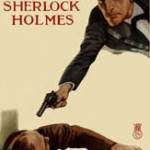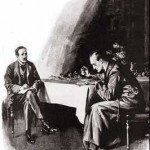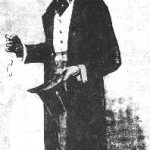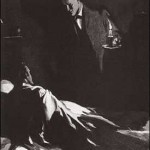But the cab slowed down at last and pulled up. In an instant Douglas Stone was out, and the Smyrna merchant’s toe was at his very heel.
“You can wait,” said he to the driver.
It was a mean-looking house in a narrow and sordid street. The surgeon, who knew his London well, cast a swift glance into the shadows, but there was nothing distinctive—no shop, no movement, nothing but a double line of dull, flat-faced houses, a double stretch of wet flagstones which gleamed in the lamplight, and a double rush of water in the gutters which swirled and gurgled towards the sewer gratings. The door which faced them was blotched and discoloured, and a faint light in the fan pane above, it served to show the dust and the grime which covered it. Above in one of the bedroom windows, there was a dull yellow glimmer. The merchant knocked loudly, and, as he turned his dark face towards the light, Douglas Stone could see that it was contracted with anxiety. A bolt was drawn, and an elderly woman with a taper stood in the doorway, shielding the thin flame with her gnarled hand.
“Is all well?” gasped the merchant.
“She is as you left her, sir.”
“She has not spoken?”
“No, she is in a deep sleep.”
The merchant closed the door, and Douglas Stone walked down the narrow passage, glancing about him in some surprise as he did so. There was no oil-cloth, no mat, no hat-rack. Deep grey dust and heavy festoons of cobwebs met his eyes everywhere. Following the old woman up the winding stair, his firm footfall echoed harshly through the silent house. There was no carpet.
The bedroom was on the second landing. Douglas Stone followed the old nurse into it, with the merchant at his heels. Here, at least, there was furniture and to spare. The floor was littered and the corners piled with Turkish cabinets, inlaid tables, coats of chain mail, strange pipes, and grotesque weapons. A single small lamp stood upon a bracket on the wall. Douglas Stone took it down, and picking his way among the lumber, walked over to a couch in the corner, on which lay a woman dressed in the Turkish fashion, with yashmak and veil. The lower part of the face was exposed, and the surgeon saw a jagged cut which zigzagged along the border of the under lip.
“You will forgive the yashmak,” said the Turk. “You know our views about women in the East.”
But the surgeon was not thinking about the yashmak. This was no longer a woman to him. It was a case. He stooped and examined the wound carefully.
“There are no signs of irritation,” said he. “We might delay the operation until local symptoms develop.”
The husband wrung his hands in uncontrollable agitation.
“Oh! sir, sir,” he cried. “Do not trifle. You do not know. It is deadly. I know, and I give you my assurance that an operation is absolutely necessary. Only the knife can save her.”
“And yet I am inclined to wait,” said Douglas Stone.
“That is enough,” the Turk cried, angrily. “Every minute is of importance, and I cannot stand here and see my wife allowed to sink. It only remains for me to give you my thanks for having come, and to call in some other surgeon before it is too late.”
Douglas Stone hesitated. To refund that hundred pounds was no pleasant matter. But of course if he left the case he must return the money. And if the Turk were right and the woman died, his position before a coroner might be an embarrassing one.
“You have had personal experience of this poison?” he asked.
“I have.”
“And you assure me that an operation is needful.”
“I swear it by all that I hold sacred.”
“The disfigurement will be frightful.”
“I can understand that the mouth will not be a pretty one to kiss.”
Douglas Stone turned fiercely upon the man. The speech was a brutal one. But the Turk has his own fashion of talk and of thought, and there was no time for wrangling. Douglas Stone drew a bistoury from his case, opened it and felt the keen straight edge with his forefinger. Then he held the lamp closer to the bed. Two dark eyes were gazing up at him through the slit in the yashmak. They were all iris, and the pupil was hardly to be seen.
“You have given her a very heavy dose of opium.”
“Yes, she has had a good dose.”
He glanced again at the dark eyes which looked straight at his own. They were dull and lustreless, but, even as he gazed, a little shifting sparkle came into them, and the lips quivered.
“She is not absolutely unconscious,” said he.
“Would it not be well to use the knife while it will be painless?”
The same thought had crossed the surgeon’s mind. He grasped the wounded lip with his forceps, and with two swift cuts he took out a broad V-shaped piece. The woman sprang up on the couch with a dreadful gurgling scream. Her covering was torn from her face. It was a face that he knew. In spite of that protruding upper lip and that slobber of blood, it was a face that he knew, She kept on putting her hand up to the gap and screaming. Douglas Stone sat down at the foot of the couch with his knife and his forceps. The room was whirling round, and he had felt something go like a ripping seam behind his ear. A bystander would have said that his face was the more ghastly of the two. As in a dream, or as if he had been looking at something at the play, he was conscious that the Turk’s hair and beard lay upon the table, and that Lord Sannox was leaning against the wall with his hand to his side, laughing silently. The screams had died away now, and the dreadful head had dropped back again upon the pillow, but Douglas Stone still sat motionless, and Lord Sannox still chuckled quietly to himself.
“It was really very necessary for Marion, this operation,” said he, “not physically, but morally, you know, morally.”
Douglas Stone stooped for yards and began to play with the fringe of the coverlet. His knife tinkled down upon the ground, but he still held the forceps and something more.
“I had long intended to make a little example,” said Lord Sannox, suavely. “Your note of Wednesday miscarried, and I have it here in my pocket-book. I took some pains in carrying out my idea. The wound, by the way, was from nothing more dangerous than my signet ring.”
He glanced keenly at his silent companion, and cocked the small revolver which he held in his coat pocket. But Douglas Stone was still picking at the coverlet.
“You see you have kept your appointment after all,” said Lord Sannox.
And at that Douglas Stone began to laugh. He laughed long and loudly. But Lord Sannox did not laugh now. Something like fear sharpened and hardened his features. He walked from the room, and he walked on tiptoe. The old woman was waiting outside.
“Attend to your mistress when she awakes,” said Lord Sannox.
Then he went down to the street. The cab was at the door, and the driver raised his hand to his hat.
“John,” said Lord Sannox, “you will take the doctor home first. He will want leading downstairs, I think. Tell his butler that he has been taken ill at a case.”
“Very good, sir.”
“Then you can take Lady Sannox home.”
“And how about yourself, sir?”
“Oh, my address for the next few months will be Hotel di Roma, Venice. Just see that the letters are sent on. And tell Stevens to exhibit all the purple chrysanthemums next Monday, and to wire me the result.”






